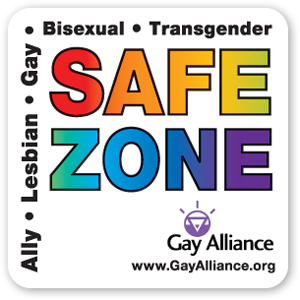
02/18/2014
A SafeZone sounds a bit like a sports term but instead it represents a new program that brings faculty and staff forward and visible to show their support for and encouragement of fellow students, faculty and staff in their diverse sexual identities.
The College’s Multicultural Life and Diversity Office staff has provided SafeZone training to members of the campus community wishing to help those who identify themselves as lesbian, gay, bisexual, transgender, queer or questioning, and intersex (LGBTQI).
Since its launch on the SUNY Cortland campus in 2012, 60 professionals and 18 students have become SafeZone certified.
SafeZone training will again be offered to faculty and staff from 3 to 6 p.m. Wednesday, Feb. 26, in the Corey Union Fireplace Lounge.
The SafeZone program works by identifying and educating LGBTQI allies, who are individuals in the Cortland community who consider themselves to be open and knowledgeable about LGBTQI topics and who choose to provide support and advocate about those who identify themselves as LGBTQI.
Both students and faculty took part in the most recent training Dec. 4 in the Corey Union Fireplace Lounge.
“The session challenged us to be more aware of our language and actions, to think and act more compassionately, and to examine our own assumptions and vulnerabilities,” says Mary Kate Boland, assistant director of campus activities.
“I feel more confident in my knowledge of LGBTQI issues and as an ally now that I am SafeZone trained,” she said. “I want students and those seeking support to know that they can get that through me and when visiting my office.”
Cortland student Gina Campese said that she learned a lot during the training session.
“The conversations that we had throughout the training were extremely eye opening,” she said. “I developed a new sense of confidence in helping anyone who might need support.
“SUNY Cortland has come a long way in the last few years regarding LGBTQI acceptance and I am happy that I can say that I am a part of the progress in the future,” Campese said.
Following the three-hour training session, individuals received a SafeZone sticker that they can use to let others know their space is considered a “SafeZone.”
By training individuals to transform their office, work and communal space into a “SafeZone,” the plan is to provide the LGBTQI community with recognizable and visible locations where one feels safe, welcomed and supported, organizers noted.
“The information, the exercises and opportunities to interact and share were enlightening and effective,” said Vicki Wilkins, a professor of recreation, parks and leisure studies, who also served as one of the two trainers for the session. “But I will have to say that my favorite part was that SafeZone training was in fact a safe zone; and I think that was true for all of us — gay, straight, informed and not so informed. I see my sticker now every time I enter my office and I am reminded of the promise I made.”